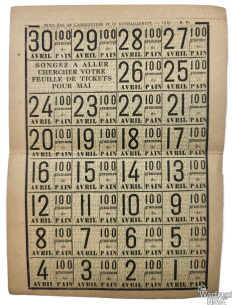
The Necessity of Rationing
Economic and Agricultural Impact: The war led to a significant reduction in agricultural labor as many men were drafted into the military. Additionally, the naval blockades by the Central Powers reduced food imports, severely impacting the availability of grain for bread.
Rationing System: Rationing was introduced not just to ensure fair distribution but to prevent hoarding and black market activities. The French government, through the Minister of Agriculture, issued ration tickets for various foodstuffs, including bread.
Bread Ration Tickets
Design and Distribution: Ration tickets for bread were small, often similar in size to postage stamps. They featured designs that included images like wheat, possibly to symbolize the food they were meant to procure. These tickets were distributed to civilians, with the amount varying based on age, occupation, and sometimes health condition.
Monthly Rationing: The quantity of bread one could receive was regulated by the number of stamps one had per month. Here's a general overview of how this might have looked:
January - March: Post-winter, when stocks might be low, rations could be reduced, perhaps around 200-250 grams per day for adults, with adjustments for children and workers.
April - June: With the arrival of new crops, there might have been a slight increase or stabilization in rations, depending on the success of the harvest and the ongoing war situation.
July - September: This period could see a peak in bread rations if the harvest was good, although the summer also meant increased troop movements, possibly affecting supply lines.
October - December: As winter approached, rations might decrease again due to the need to conserve for the colder months, potentially back to or below spring levels.
Life with Rationing
Daily Life: For the average French citizen, these tickets were a daily necessity. People had to plan their meals around what was available, leading to creative cooking with substitutes like potatoes or less desirable grains when wheat was scarce.
Black Market and Substitutes: Despite strict regulations, a black market existed where ration tickets could be traded or sold. Substitutes for bread, like the aforementioned K-Brot in Germany, might have been introduced, using ingredients like barley or oats to extend supplies.
Impact on Society
Health and Nutrition: The diet during WWI was often lacking in variety and nutrition, leading to health issues among the populace. However, the necessity of rationing also pushed for more equitable food distribution, which in some ways improved overall food security compared to pre-war disparities.
Cultural Changes: The war changed eating habits, with bread becoming less of a given and more of a regulated luxury. This shift had long-term effects on French cuisine and food culture.
Conclusion
The ration ticket stamps for bread during WWI in France were not just a wartime necessity but a stark reminder of the war's impact on civilian life. They represented the government's attempt to maintain order and equity in food distribution during turbulent times. Today, these tickets serve as historical artifacts, illustrating a period when even the most basic of foods like bread was a precious commodity, directly tied to the fortunes of war.




Comments (0)